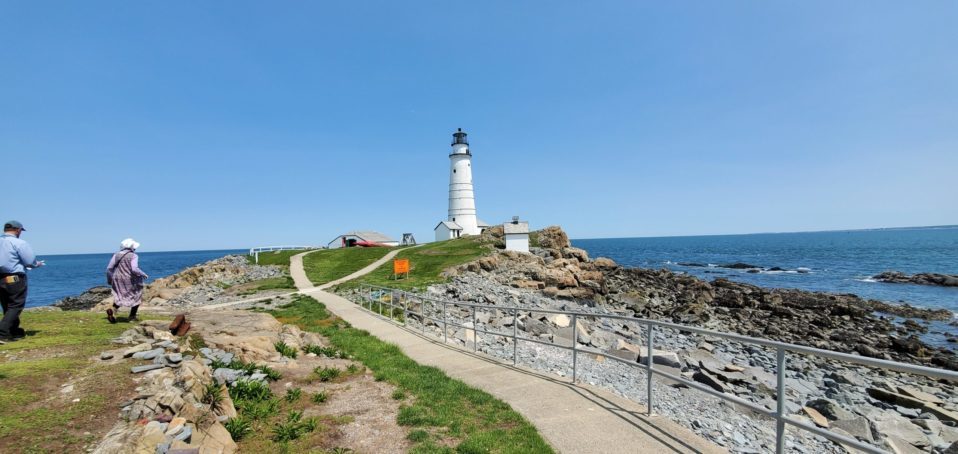
June 3, 2021 Boston Harbor Islands National and State Park area designated one of America’s 11 most endangered historic places due to climate threats
HBI was one of several organizations invited to join a May 19th boat trip to the nation’s first lighthouse – Boston Light – on Little Brewster Island in Boston Harbor. An iconic local landmark, Boston Light was built in 1716 and destroyed by the British in 1776. Rebuilt in 1781 and extended in 1856, it is the second oldest working navigational lighthouse in the US and will remain so under the auspices of the United States Coast Guard, even after a planned disposition of the island and other buildings on Little Bewster. Read the press release below about the future of the island.
June 3, 2021 (BOSTON, MA) – Leaders from government, the Massachusett Tribe at Ponkapoag, and local civic and research organizations responded today to news that the Boston Harbor Islands National and State Park Area has been designated one of America’s 11 Most Endangered Historic Places. The list is released annually by the National Trust for Historic Preservation, which this year included the Boston Harbor Islands due to the risks they face from climate change, sea level rise, and erosion.
This designation comes at a time when the Boston Harbor Islands are celebrating the anniversary of the state and national park protections put in place 50 and 25 years ago, respectively. The collaborative nature of the park’s management structure has become a model for partnerships in cultural landscape management.
The Islands are deeply meaningful to people and provide a robust natural ecosystem for animals and plants. They are a sacred space to the Massachusett Tribe, which has been in relationship with the Islands for 12,000 years. Other tribal groups have strong postcolonial ties to the islands and are actively engaged in their protection today. The Harbor Islands are home to nationally significant archaeological and cultural sites. They are North America’s only glacially-derived drumlin island cluster and a habitat for multiple coastal nesting bird species.
Moreover, the Islands are one of the region’s largest public spaces – open and accessible for all to visit, enjoy, and be rejuvenated by the beautiful setting.
While the Islands face challenges, partners have a strong record of collaboration and are building solutions together. These solutions include:
-
- The Stone Living Lab, a new hub testing nature-based resilience solutions and engaging the public to become climate stewards;
- The City of Boston is developing an archeological climate action plan, a new and collaborative strategy to preserve historic and cultural resources in a changing climate; and
- Programs developed by the National Park Service and Boston Harbor Now to engage the next generation in learning about and stewarding park spaces.
Here are how stakeholders responded to the news today. Each is available for comment.
“This designation is a call-to-action: we must double down on our efforts to protect the Boston Harbor Islands National and State Park Area from climate threats, supporting ecological restoration and promoting public access to inspire future generations of park stewards,” said Kathy Abbott, president and CEO of Boston Harbor Now. “This means investing in climate resilience solutions, ramping up community science and education initiatives, and continuing to raise broad awareness of the importance of the Islands to our region’s past, present, and future. We’ll only succeed through collaboration, and everyone has a role to play.”
“I am grateful that the unique story and significance of the Harbor Islands has received this recognition, and proud that we are underway with a new Community Preservation Commission-funded archaeological climate action plan,” the City of Boston’s Chief of Environment, Energy, and Open Space, Mariama White-Hammond stated. “We look forward to working with Native communities and Island partners to help preserve and document the Harbor Islands’ cultural, ecological, and historical archaeological sites for years to come.”
“10,000 years ago when Boston Harbor was dry land, we were here,” said Elizabeth Solomon, elder of the Massachusett Tribe at Ponkapoag. “The Boston Harbor Islands are one of the few places in the greater Boston area that remain relatively undeveloped and the millennia-long histories of the Native peoples of the greater Boston area and the Massachusett Tribe in particular are held within them. Our ancestors belonged to this place, we belong to this place, and we continue to hold the islands sacred.”
“The National Trust for Historic Preservation’s designation is a call to action for land managers and community members alike to work together and invest in solutions that preserve these special places,” said Michael Creasey, Superintendent of the National Parks of Boston.
“We have long recognized that the Boston Harbor Islands are vulnerable to the threats of sea level rise, climate change, and erosion,” said Paul Kirshen, director of the Stone Living Lab and professor at the UMass Boston School for the Environment. “The Stone Living Lab is using the existence of these threats as an opportunity to carry out place-based research to determine robust and sustainable means to protect the Islands and the mainland from them.”
“This designation bolsters the need to continue The Trustees’ work in protecting our most vulnerable places along the coast, where properties like World’s End have been occupied and treasured for millennia by Massachusetts Indigenous and transplanted cultures. Their archaeological record holds untold research information for us all about that history, yet it is especially susceptible to the effects of climate change and requires us all to find sustainable solutions,” said Jocelyn Forbush, Acting President & CEO of The Trustees.
###



